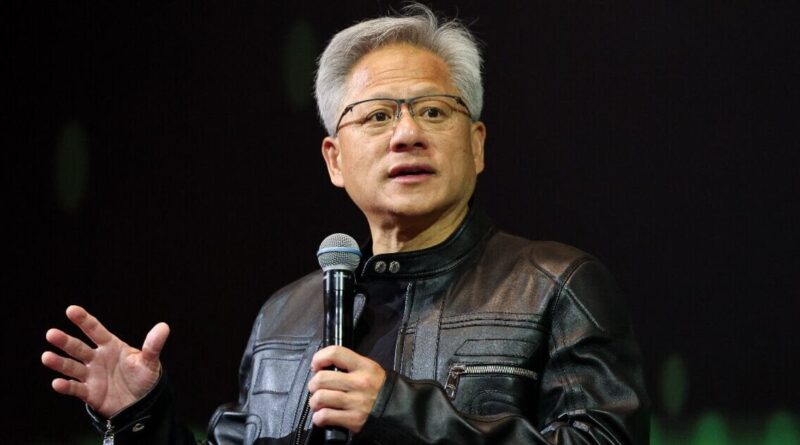‘I’m an investment expert – and here’s what you should know about AI’
Questions about the future of articial intelligence investment continued this week despite the world’s most valuable company Nvidia posting $46.7billion (£34.6bn) in revenue. The tech giant fell 0.8% after reporting quarterly earnings and revenue which still beat Wall Street analysts’ forecasts. The company reported that sales of its AI chipsets rose at a slower pace than analysts expected.
Investors consider Nvidia a barometer for the strength of the boom in artificial intelligence because the company makes most of the chips which power the technology. Its heavy weighting also gives Nvidia outsized influence as a bellwether for the wider market.
Despite the excitement about the tech over the past couple of years, a recent study by the Massachusetts Institute of Technology (MIT) found 95% of organisations are getting zero financial returns from investments in generative AI.
MIT’s study spooked investors around the world when it was published and effectively acted as a preview of what might happen to AI-linked shares if the numbers don’t stack up on spending in the technology.
The AI boom has sent stock markets soaring to new heights and made Nvidia the first publicly traded company with a $4trillion (£2.97tn) market value. But in recent weeks, the possibility of the AI bubble bursting has been raised as shares in US tech fell. MIT’s analysis came after OpenAI’s boss, Sam Altman, recently described some company valuations as “insane”.
AI has been riding a wave of investment in software, chips and data centres as capital is pumped into the infrastructure needed for the future economy, according to Nigel Green, founder and Chief Executive of independent financial adviser, deVere Group.
Mr Green told the Daily Express he doesn’t see the AI bubble bursting “at the moment” and Nvidia’s latest results showed the tech giant was moving from “hyper growth to high growth”. Mr Green added: “This matters because markets have priced Nvidia as if its rate of expansion could continue indefinitely, and that level of outperformance was never sustainable.”
Recent reports suggest Microsoft and Meta account for about 30% of Invidia’s total revenue, leading some to talk of vulnerability. Mr Green said if either tech giant were to rein in spending, then the shockwaves would hit immediately and markets don’t like that level of exposure.
The Chief Exec said competitors such as Intel and AMD are also scaling new products while US restrictions on sales to China are limiting Nvidia’s access to a market worth some £37billion ($50bn).
DeVere’s boss said markets are currently stretched, with valuations at historic highs, adding: “The concentration of performance in just a handful of mega-cap stocks makes markets more fragile. This is why a stumble by one or two names could spark a sharp correction.
“It wouldn’t mean AI itself has failed of course – it’s the future – but it could create volatility across global equities.” He said a pullback in the US would ripple through the FTSE, hit sterling-sensitive earnings and dent sentiment in Britain.
Dan Coatsworth, Investment Analyst at AJ Bell, said technological revolutions typically play out over a series of cycles and the same will apply to AI. He told the Daily Express: “We’ve had the discovery stage with AI, and there has been widespread acknowledgement that it could transform multiple industries.
“That’s caused a lot of excitement on stock markets for companies enabling AI and to a lesser extent, ones that could benefit from using the technology.
“Now comes the hard part – showing capital expenditure can produce an adequate financial return to justify the expense. Failure to do so could cause investors to lose interest in AI.”
Mr Coatsworth explained that right now companies such as Microsoft and Alphabet are feeding off a splurge in AI-related spending, investing heavily to expand infrastructure to support cloud computing demand and AI services.
Chip companies including Nvidia and TSMC are working flat out to respectively design and build the semiconductors required to process AI, according to the analyst.
He added: “The risk lies in whether exuberance leads to over-investment. One could argue we’re still in the early stages of the AI boom and there are plenty of reasons to stay optimistic from an investment perspective. For example, governments could ramp up spending on all things AI-related and feed the gravy train.
“However, the scale of investment into AI is so vast that it’s important to consider the potential fallout if it turns out that money has been poured down the drain.”
Mr Coatsworth said: “Investors who believe the AI story still has legs should seek diversification and not bet on a single company to get rich. It’s important to spread your risks as no one knows who tomorrow’s winners or losers in this space will be.”
Mr Green said: “Investors should act with discipline. The right approach is not to exit AI, but to build resilience. This means checking portfolios are genuinely diversified and not excessively dependent on a narrow group of US tech giants. Balance with other sectors, regions and asset classes is crucial.
“Clearly, AI is transformative and here to stay. However, markets can overheat in the short term and protecting portfolios against volatility is essential. Those who position sensibly now will be best placed to capture the long-term rewards of the AI revolution without being blindsided if exuberance cools.”





